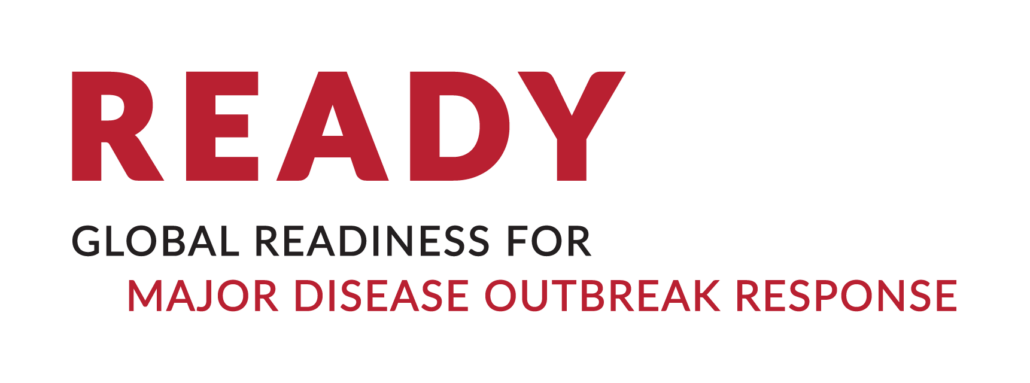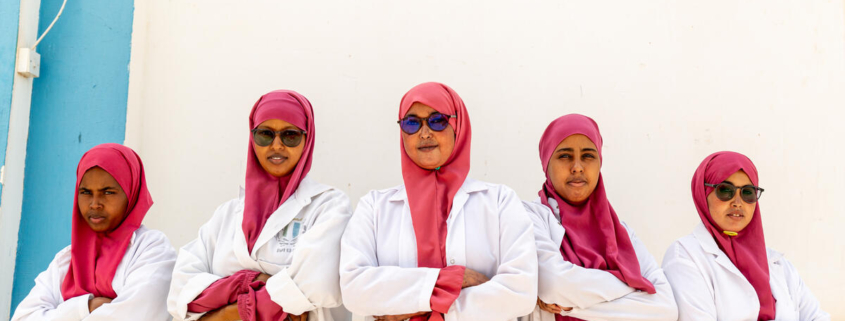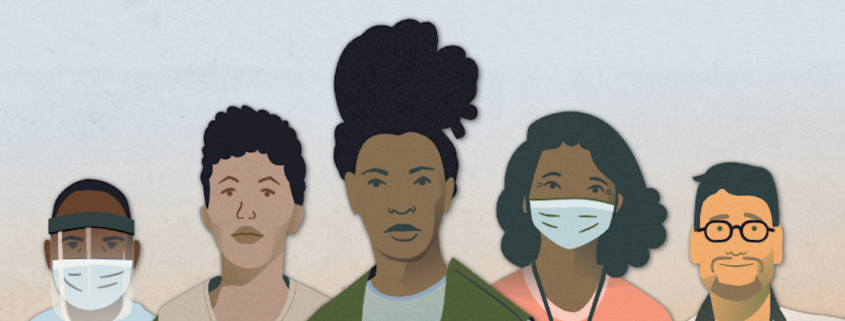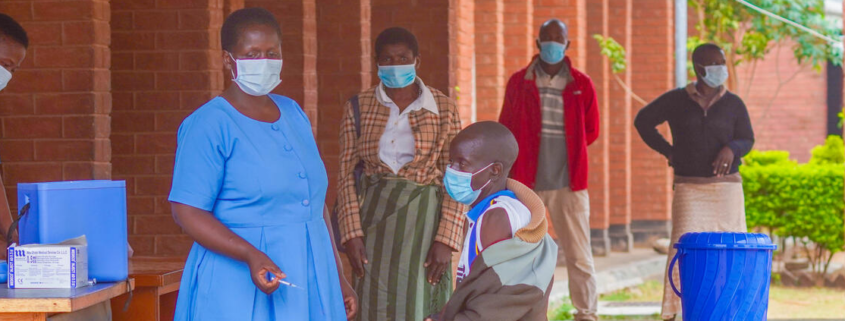TAYARI masasisho ya machapisho hapa—habari, matangazo na masasisho mengine kuhusu mpango huo.
Global Launch Webinar: Fit for purpose? Global Coordination Mechanisms of Large-Scale Epidemic Responses in Humanitarian Settings
23 JANUARY 2024 | 09:00-10:00 EST / 13:00-14:00 UTC / 15:00-16:00 EAT || Speakers: Paul Spiegel, Abdi Raman Mahamud, Natalie Roberts, Sorcha O’Callaghan, Sonia Walia (see speaker bios below)
This webinar launched READY’s new report: Fit for purpose? Global Coordination Mechanisms of Large-Scale Epidemic Responses in Humanitarian Settings.
The paper, developed in collaboration with Johns Hopkins Center for Humanitarian Health, examines global structures and processes on epidemic coordination mechanisms and provides clear recommendations for improving large-scale epidemic response coordination in humanitarian emergencies. View/download this two-page brief that outlines the background, methodology, and key recommendations, and/or view/download the complete report (1 MB .pdf).
-
Tazama rekodi:
–
Moderated by Paul Spiegel, Director at the Center for Humanitarian Health, Johns Hopkins University, the webinar featured an expert panel discussion between public health and humanitarian experts.
Jisajili kwa orodha ya barua pepe ya READY kupokea matangazo ya siku za usoni kuhusu fursa za mafunzo, mifumo ya mtandao na masasisho mengine.
Featured expert moderator and panelists:
(See full speaker bios below)
- Msimamizi: Paul Spiegel, Director, Center for Humanitarian Health at John Hopkins University
- Panelists
- Abdi Raman Mahamud, Director for Alert and Response, World Health Organization
- Natalie Roberts, Executive Director, Médecins Sans Frontières UK
- Sorcha O’Callaghan, Director Humanitarian Policy Group, Overseas Development Institute (ODI)
- Sonia Walia, Senior Health Advisor, Bureau for Humanitarian Assistance USAID
Tukio hili liliandaliwa na mpango wa READY, unaoongozwa na Save the Children, na kufadhiliwa na Ofisi ya Usaidizi wa Kibinadamu ya USAID.
Jisajili kwa orodha ya barua pepe ya READY kupokea matangazo ya siku za usoni kuhusu fursa za mafunzo, mifumo ya mtandao na masasisho mengine.
Expert Moderator and Panelist Bios
Paul Spiegel, Director, Center for Humanitarian Health at John Hopkins University
Dr. Spiegel, a Canadian physician and epidemiologist by training, is one of the few humanitarians in the world who both responds to and researches humanitarian emergencies. He is internationally recognized for his research on preventing and responding to humanitarian emergencies, and more recently broader issues of migration. Beginning in 1992 as a Medical Coordinator responding to the refugee crisis for the “lost boys of Sudan” in Kenya, Dr. Spiegel has responded to and managed numerous humanitarian crises in Africa, Asia, Europe, and the Middle East for over 30 years. Most recently he managed the emergency response for WHO in Afghanistan (Nov/Dec 2021) and in Europe for the Ukrainian refugees (Mar/Apr 2022).
Dr. Spiegel is the Director of the Johns Hopkins Center for Humanitarian Health and Professor of the Practice in the Department of International Health at the Johns Hopkins Bloomberg School of Public Health (JHSPH). Before JHSPH, Dr. Spiegel was the Deputy Director of Program Support and Management and the Chief of Public Health at the United Nations High Commissioner for Refugees. He previously worked as a Medical Epidemiologist in the International Emergency and Refugee Health Branch at the Centers for Disease Control and Prevention in the United States, a Medical Coordinator with Médecins Sans Frontières and Médecins du Monde in refugee emergencies and has been a consultant for numerous international organizations including the Canadian Red Cross and WHO. Dr. Spiegel was the first Chair of the Funding Committee for Research for Health in Humanitarian Crises (2013-2018). He has published over 150 peer-reviewed articles on humanitarian health and migration. He has served as a Commissioner on the Lancet Commission for Migration and Health and the Lancet Commission on Syria. He is currently co-chair of Lancet Migration.
Abdirahman Raman Mahamud, Director for Alert and Response, World Health Organization
Dr. Abdirahman Mahamud is a global public health leader and a medical epidemiologist with over 20 years’ experience working in clinical medicine, humanitarian health responses, coordinating prevention, preparedness, and responses to vaccine-preventable diseases, epidemics, pandemics, and other public health emergencies at the national, regional, and international levels. Dr Mahamud is the current director, a.i, of Alert and Response Coordination department, WHO Health Emergencies Program since January 2022, leading WHO’s functions in early detection, risk assessment, event management, and response coordination of acute public health events including the 65 graded emergencies in 2023 under the three-tier grading. system.
Dr Mahamud was the Global COVID-19 Incident Manager, coordinating WHO’s COVID-19 technical, operational, and strategical response plans in 2021–2023. Dr Mahamud was immediately deployed to Manila, Philippines after the initial cases of novel coronaviruses were confirmed in January 2020, where he was the WHO’s West Pacific Region COVID-19 Incident Manager during the first phase of the pandemic response. Previously, Dr Mahamud worked as the WHO Pakistan National Team Leader for Polio Eradication Program and was a key member of Pakistan’s National Emergency Operation Centre for five years. Dr Mahamud has worked as disease surveillance officer in Dadaab, northeastern Kenya, then the world’s biggest refugee camp, in 2008–2010, where he participated and supported preparedness, detection and response of communicable disease outbreaks.
Natalie Roberts, Executive Director, Médecins Sans Frontières (MSF) UK
Dr Natalie Roberts is the Executive Director of Médecins Sans Frontières (MSF) in the UK. A medical doctor, she has worked for MSF in various medical humanitarian contexts in Africa, Asia and the Middle East, including in settings of violence and conflict, infectious disease outbreaks, population displacement, natural disaster and nutritional crises. Between 2016 and 2019 Natalie was the Head of Emergency Operations for MSF in Paris, during which time MSF was part of the response to the world’s 2ndlargest Ebola outbreak in Eastern DRC. Between 2020 and 2022 she was a Director of Studies at Crash, an MSF thinktank, where the focus of her reflection was MSF’s positioning and practices relating to epidemic response, particularly Ebola. Natalie holds a medical degree from Cambridge University and Imperial College London. She also holds an MA in the History and Philosophy of Science from Cambridge, and an MSc in Violence, Conflict and Development from SOAS London.
Sorcha O’Callaghan, Director Humanitarian Policy Group, Overseas Development Institute (ODI)
Sorcha O’Callaghan is the Director of the Humanitarian Policy Group at ODI, one of the world’s leading think tanks on humanitarian affairs. She leads HPG’s strategy, representation and fundraising for research on rights in crises, humanitarian system reform, and resilience in climate and conflict affected environments. A specialist in displacement, civilian protection and humanitarian action, she has worked extensively in East Africa and her policy, academic and media work has been published widely. Prior to HPG she was Head of Humanitarian Policy at the British Red Cross and previously coordinated the Sudan Advocacy Coalition, an NGO policy and advocacy consortium in Sudan. With a background in law, Sorcha has also worked in the refugee and asylum sector in Ireland.
Sonia Walia, Senior Health Advisor, USAID’s Bureau for Humanitarian Assistance
Sonia Walia is a Senior Health Advisor for USAID’s Bureau for Humanitarian Assistance (BHA), which leads the US Government’s international disaster assistance efforts. With a mandate to save lives, alleviate human suffering, and reduce the impact of disasters, BHA monitors, mitigates, and responds to global hazards and humanitarian needs. As a Senior Health Advisor, Ms. Walia supports the Bureau’s responses through humanitarian health technical assistance, providing technical leadership and guidance within the US Government and globally. She has responded to complex emergencies and natural disasters for over 15 years, including South Sudan, Pakistan, Afghanistan, Burma, and Indonesia. Ms. Walia also served on USAID’s COVID-19 Task Force as an advisor under the Program and Strategic Planning Pillar. During the West Africa Ebola Response, she served as the Team Lead in Sierra Leone for the Disaster Assistance Response Team and deployed multiple times to support USAID’s response to Ebola in Northeast DRC. She continues to be very active in the Global Health Cluster and sits on its Strategic Advisory Group. She works across the US Government’s interagency to educate on and advocate for humanitarian health assistance. Ms. Walia holds a Respiratory Therapy degree from the Medical College of Georgia and Master of Public Health degree from The Johns Hopkins Bloomberg School of Public Health.
Jisajili kwa orodha ya barua pepe ya READY kupokea matangazo ya siku za usoni kuhusu fursa za mafunzo, mifumo ya mtandao na masasisho mengine.
This event is hosted by the READY initiative, led by Save the Children, and funded by the USAID Bureau for Humanitarian Assistance.
Global Launch Webinar of New Simulation—Outbreak READY2 !: Thisland in Crisis
READY held the global launch webinar of Mlipuko TAYARI 2!: Nchi hii iko katika Mgogoro on Thursday, 14 December.
-
Tazama rekodi:
–
Jisajili kwa orodha ya barua pepe ya READY ili kupokea matangazo ya siku za usoni kuhusu fursa za mafunzo, mitandao na masasisho mengine
Mlipuko TAYARI 2!: Nchi hii iko katika Mgogoro is an online digital simulation designed to strengthen the capacity of humanitarian health practitioners to respond to infectious disease outbreaks in humanitarian settings. Players take the role of a Health Program Manager leading an NGO health response during an evolving infectious disease outbreak. Throughout the simulation, players must identify, assess, and interpret sources of data to plan and implement an integrated outbreak response that prioritizes risk communication and community engagement, protection principles, and staff safety and wellbeing. Through a unique, digital interpretation of an outbreak simulation, Outbreak READY 2!: Thisland in Crisis brings the complex nature of a humanitarian outbreak response to life.
Mlipuko TAYARI 2!: Nchi hii iko katika Mgogoro and its accompanying solo-play and group facilitation tools are now available to access via the READY website. This launch event included a live demo of Mlipuko TAYARI 2! and featured information about the simulation and its corresponding facilitation tools, including how individuals and organizations can utilize this unique training opportunity.
We would like to thank the many individuals who contributed to the development of Mlipuko TAYARI 2!: Nchi hii iko katika Mgogoro. We invite you to play the simulation and to share it within your networks.
This event ws hosted by the READY initiative, led by Save the Children, and funded by the USAID Bureau for Humanitarian Assistance.
Jisajili kwa orodha ya barua pepe ya READY ili kupokea matangazo ya siku za usoni kuhusu fursa za mafunzo, mitandao na masasisho mengine
Launch Event: Locally Led Action in Outbreak Response
29 NOVEMBER 2023 | 08:00-09:00 EST / 13:00-14:00 BST / 15:00-16:00 EAT || Launch of a new report on progress toward locally-led outbreak readiness and response || Speakers: Degan Ali, Adeso; Jameel Abdo, Tamdeen Youth Foundation; Dr. Eba Pasha, Global Health Cluster; Dr. Alex Mutanganayi Yogolelo, Humanitarian Public Health Specialist (See full speaker bios below)
-
Tazama rekodi:
–
The READY initiative invited the humanitarian health community to the launch of this new report: Why the delay? Perspectives of national and local actors on progress towards locally led outbreak readiness and response during a one-hour webinar on November 29th (08:00-09:00 EST / 13:00-14:00 BST / 15:00-16:00 EAT). The report is available as a 38-page PDF; a two-page brief is also available.
The paper, developed in collaboration with Anthrologica, consolidates local perspectives on actions needed to accelerate change for effective and meaningful locally-led action in preparing for and responding to major disease outbreaks in humanitarian settings, and to better respond to the holistic needs of affected populations.
The webinar was moderated by Adeso’s Executive Director Degan Aliand showcased an expert panel discussion between global and national humanitarian and public health experts and their reflections on localization challenges and proposed solutions to advance locally-led action in outbreak preparedness, readiness, and response efforts.
Featured expert moderator and panelists
- Msimamizi: Degan Ali, Executive Director, Adeso, Kenya
- Panelists:
- Jameel Abdo, CEO, Tamdeen Youth Foundation,Yemen
- Dr. Eba Pasha, Technical Officer, Global Health Cluster
- Dr. Alex Mutanganayi Yogolelo, Humanitarian Public Health Specialist, Democratic Republic of Congo
Tukio hili liliandaliwa na mpango wa READY, unaoongozwa na Save the Children, na kufadhiliwa na Ofisi ya Usaidizi wa Kibinadamu ya USAID.
Moderator and Panelist Bios
Degan Ali, Executive Director – Adeso (Moderator)
Degan Ali is an internationally-renowned humanitarian leader who has been at the forefront of shifting power for decades. She is a Rockefeller Foundation Global Fellow for Social Innovation, a contributor to the Overseas Development Institute/Humanitarian Policy Group and the Global Food Security Journal. Degan is also the co-founder of the first Global South civil society network for local and national humanitarian organizations, the Network for Empowered Aid Response (NEAR). She is an innovator, translating ground-breaking ideas into action, such as pioneering the first large-scale cash transfer, in 2003 in Somalia, leading the transition to global acceptance of cash assistance. Her work has been featured in The New York Times, Al Jazeera, and The Guardian. Her key achievements include leading Adeso in pioneering cash transfers, establishing the 25% localization target as part of the Grand Bargain Commitment. She is based in Kenya and works with organizations and philanthropists across the globe, bringing together and identifying efforts to decolonize aid and philanthropy.
Jameel Abdo, CEO, Tamdeen Youth Foundation (Panelist)
Jameel Abdo has more than 22 years of experience in program and project management in the humanitarian and non-humanitarian fields and 15 years of experience in management positions. Jameel holds a Master’s in Project Management and a Bachelor of Science in Civil Engineering. Jameel has more than seven years of leadership experience in humanitarian work, emergency response project management, economic recovery, peacebuilding, and local development. He thoroughly understands the humanitarian and social context and the needs of conflict-affected populations and groups in Yemen. Jameel is the CEO of the Tamdeen Youth Foundation, which leads the localization movement in Yemen. Jameel is working closely with ICVA, RSH, NEAR, and other national, regional, and global platforms. Jameel is a member of the NEAR Leadership Council and member of Operational Policy and Advocacy Group (OPAG).
Dr. Eba Pasha, Technical Officer, Global Health Cluster (Panelist)
Dr. Eba Pasha is a global public health specialist and emergency medicine doctor with over 20 years’ experience working in humanitarian crises, health emergencies, health system strengthening and coordination in fragile, conflict or low-income countries. She is technical officer for the Global Health Cluster (GHC) supporting developing and implementing its strategy for localization, as well as lead for the COVID-19 Task Team which with 30 partners produced, tools guidance, advocacy, as well as lessons learned studies on COVID-19 response in humanitarian settings. Dr Pasha has worked with a variety of organizations from local to international NGOs, the UN, and donors. She is also co-founder and director of a small NGO working in rural flood prone areas of Bangladesh, her country of heritage, focusing on women’s empowerment activities, health care including CEmONC, children’s education and often the primary and only responder in disasters. She has technical expertise in coordination and consensus building, developing minimum standards in humanitarian response, strategy development, qualitative and quantitative research, monitoring and evaluation.
Dr. Alex Mutanganayi Yogolelo, Humanitarian Public Health Specialist (Panelist)
Dr. Alex Mutanganayi Yogolelo is a committed humanitarian actor with a developed skill for strategic reflection, critical analysis and leadership skills that can be utilized in some of the most challenging and complex environments around the world. Dr. Alex’s areas of expertise include the development and management of a humanitarian response, supporting the implementation of a multi sector program by providing an overall strategic oversight to the program portfolio, and ensuring programs are delivered to the appropriate scale, scope, quality, and accountability expected. Dr. Alex started his career in different local Congolese NGOs as a health advisor and worked as a medical doctor in various hospitals in and outside of DRC. He joined Save the Children International (SCI) in October 2014 to respond to the West Africa Ebola outbreak. From August 2018 up to March 2020, Dr. Alex was the SCI Ebola clinical lead and deputy team leader program in Grand Nord Kivu based in Beni, DRC and joined Kinshasa in April 2020 to support the COVID-19 response as the response team lead.
Jisajili kwa orodha ya barua pepe ya READY ili kupokea matangazo ya siku za usoni kuhusu fursa za mafunzo, mitandao na masasisho mengine




